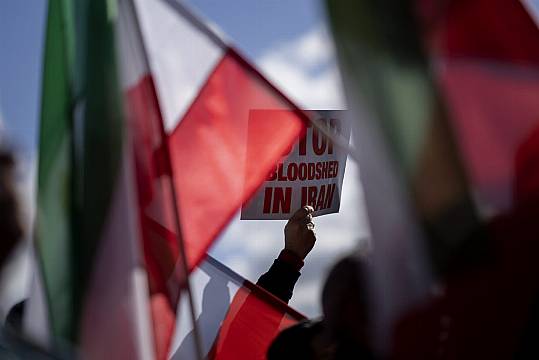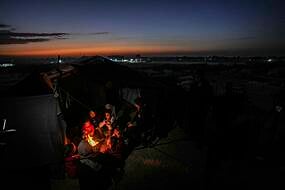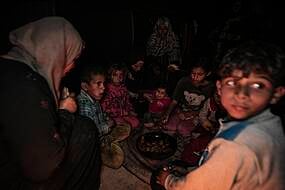Iran has intensified its crackdown on Kurdish areas in the country’s west as protests sparked by the death of a 22-year-old woman detained by the morality police rage on, activists said.
Riot police fired into at least one neighbourhood in Sanandaj, the capital of Iran’s Kurdistan province, as Amnesty International and the White House’s national security adviser criticised the violence targeting demonstrators angered by the death of Mahsa Amini.
Meanwhile, some oil workers on Monday joined the protests at two key refinery complexes, for the first time linking an industry key to Iran’s theocracy to the unrest.
Workers claimed another protest on Tuesday in the crucial oil city of Abadan, with others calling for protests on Wednesday as well.

Iran’s government insists Ms Amini was not mistreated, but her family says her body showed bruises and other signs of beating.
Subsequent videos have shown security forces beating and shoving female protesters, including women who have torn off their mandatory headscarf, or hijab.
From the capital, Tehran, and elsewhere, videos have emerged online despite authorities disrupting the internet.
Videos on Monday showed university and high school students demonstrating and chanting, with some women and girls marching through the streets without headscarves as the protests continue into a fourth week.
The demonstrations represent one of the biggest challenges to Iran’s theocracy since the 2009 Green Movement protests.
One video posted online by a Kurdish group called the Hengaw Organisation for Human Rights showed darkened streets with apparent gunfire going off and a bonfire burning in Sanandaj, some 400 kilometres (250 miles) west of Tehran.
Another showed riot police carrying shotguns moving in formation with a vehicle, apparently firing at homes.
A video posted later on Tuesday purportedly showed a massive bullet hole inside the home of one Sanandaj resident, a hole that Hengaw alleged came from a heavy .50-calibre machine gun – the type often mounted to armoured vehicles.

Another video purportedly showed security forces randomly firing in the air while arresting someone there on Monday.
The New York-based Centre for Human Rights in Iran posted another video showing what it described as a phalanx of motorcycle-riding security forces moving through Sanandaj.
“They reportedly broke the windows of hundreds of cars in the Baharan neighbourhood,” the centre said.
Ms Amini was Kurdish and her death has been felt particularly in Iran’s Kurdish region, where demonstrations began on September 17 at her funeral there after her death the day before.
Amnesty International criticised Iranian security forces for “using firearms and firing tear gas indiscriminately, including into people’s homes”.
It urged the world to pressure Iran to end the crackdown as Tehran continues to disrupt internet and mobile phone networks “to hide their crimes”.
Iran did not immediately acknowledge the renewed crackdown in Sanandaj.
However, Iran’s Foreign Ministry summoned the British ambassador over the United Kingdom sanctioning members of the country’s morality police and security officials due to the crackdown.
These protestors are Iranian citizens, led by women and girls, demanding dignity and basic rights. We stand with them, and we will hold responsible those using violence in a vain effort to silence their voices.
— Jake Sullivan (@JakeSullivan46) October 10, 2022
Iran’s Foreign Ministry called the sanctions “arbitrary and baseless”, even while threatening to potentially take countermeasures against London.
Jake Sullivan, US president Joe Biden’s national security adviser, similarly noted that “the world is watching what is happening in Iran”.
“These protestors are Iranian citizens, led by women and girls, demanding dignity and basic rights,” Mr Sullivan wrote on Twitter.
“We stand with them, and we will hold responsible those using violence in a vain effort to silence their voices.”
On Monday, workers held demonstrations in Abadan and Asaluyeh, a key point for Iran’s massive offshore natural gas field in the Persian Gulf it shares with Qatar.
Iran’s state-run IRNA news agency on Tuesday claimed the Asaluyeh demonstration was a strike over wages.
Videos of the protests included workers chanting: “This is the bloody year Seyyed Ali will be overthrown,” referring to Iran’s supreme leader Ali Khamenei without his Shiite religious title of ayatollah.

Workers also said several of their colleagues had been detained by authorities after their protests on Tuesday.
On Tuesday, the Contractual Oil Workers Protest Organising Council claimed another strike at Abadan, posting videos outside the massive refinery complex in the city near the Iraqi border.
The details in the videos correspond with each and to known features of the facility compared against satellite photos taken in recent months.
It remains unclear how many people have been killed or arrested so far.
An Oslo-based group, Iran Human Rights, estimates at least 185 people have been killed.
This includes an estimated 90 people killed by security forces in the eastern Iranian city of Zahedan amid demonstrations against a police officer accused of rape in a separate case.
Iranian authorities have described the Zahedan violence as involving unnamed separatists, without providing details or evidence.
Iran’s judiciary spokesman Masoud Setayeshi reportedly said on Tuesday that Iran so far has released some 1,700 people arrested in the recent demonstrations, without offering a total figure for those detained so far.
Meanwhile on Tuesday, Iranian government spokesman Ali Bahadori Jahromi alleged without providing evidence that US sanctions affected Ms Amini’s ability to get medicine for the chronic illnesses she faced.
However, an Iranian government report on Friday said that she was taking hydrocortisone and levothyroxine – two medicines made in Iran available in pharmacies in the country.







